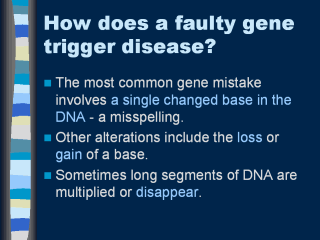 |
A sound body depends on the continuous interplay of thousands of proteins,
acting together in just the right amounts and in just the right places - and
each properly functioning protein is the product of an intact gene. Genes can be
altered (mutated) in many ways. The most common gene mistake involves a single
changed base in the DNA - a misspelling. Other alterations include the loss or
gain of a base. Sometimes long segments of DNA are multiplied or disappear.
Some mutations are silent; they affect neither the structure of the encoded
protein nor its function. Other mutations result in an altered protein. In some
instances, the protein is normal enough to function, but not well; this is the
case of the flawed hemoglobinthe oxygen-carrying protein in the blood that
causes sickle-cell anemia. In other instances, the protein can be totally
disabled. The outcome of a particular mutation depends not only on how it alters
a protein's function but also on how vital that particular protein is to
survival. |
